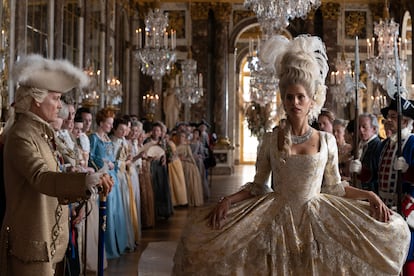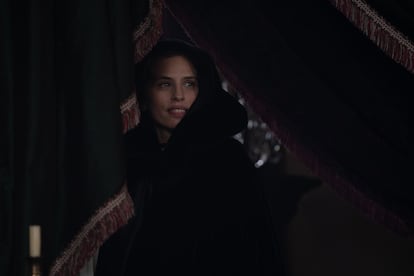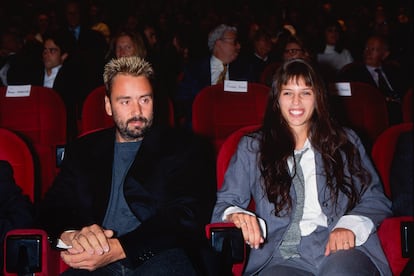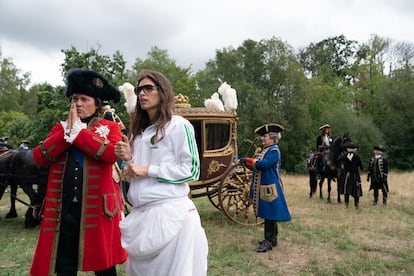Maïwenn: ‘Problems with Johnny Depp? There are tensions on every shoot’
The director and star of the movie ‘Jeanne du Barry,’ which premiered at Cannes this year, explains her assault on a journalist and says that Depp ‘fills the character with his presence’


When Maïwenn, 47, first met Luc Besson, she was 12 and he was 29. They didn’t start dating until she was 15 and, as she has said on other occasions, at the time she was coming out of a painful relationship with her divorced parents, who had each, in their own way, abused her psychologically. By the time she was 16, she was already a mother and was living with Besson in Los Angeles; she had abandoned her budding acting career. Despite these facts, Maïwenn Aurélia Nedjma Le Besco, her full name, has always asserted that she has been in control of her life, that she has done what she wanted as much as possible. “The Professional [directed by Besson in 1994] was partly based on the relationship between Luc and me,” she has recounted, meaning that she didn’t feel like much of a child at the time. After her divorce, she returned to France, performed humorous one-woman shows, returned to cinema as an actress and began a career as a director. That last pursuit brought her to the most recent Cannes Film Festival, where she recently premiered her sixth feature film as a director, Jeanne du Barry, in which she also co-stars with Johnny Depp.
When Maïwenn connected by video call for this interview, it had been a long time since her decision to cast Depp in the role of Louis XV sparked a firestorm against her in the press and on social media last May. The Hollywood actor comes with the baggage of the scabrous scandals of his toxic marriage to Amber Heard and his legal woes. As for Maïwenn herself, last February, she assaulted the editor-in-chief of the website Mediapart in a Parisian restaurant after the outlet published a story on Besson’s alleged abuses of several actresses, including rape, as part of its coverage of sexual assaults in France’s entertainment industry. Between May (when the Cannes Film Festival is held) and this interview, the courts acquitted Besson for the third and final time and the director went to Venice to debut his new work, DogMan. Before the video call, Maïwenn said that nothing would be off limits in the interview: there would be time to talk about everything.
We start with her film work and the challenge of portraying a character who has become a feminist icon in the 21st century for her struggle for empowerment at the court of Louis XV, the Sun King’s great-grandson and heir. “In reality,” the filmmaker begins, “I knew nothing about her existence. When I saw Marie Antoinette, Sofia Coppola’s film, I got the bug, and I read a fascinating biography about Countess de Barry.” In that 2006 drama, Rip Torn played Louis XV, with Asia Argento in the role of Barry, the monarch’s last mistress. Evidently, the cast maintained the 33-year age difference between the couple; Jeanne du Barry entered Louis XV’s Versailles apartments at the age of 26. “In the beginning, I was not going to play Jeanne. The desire to do her was always there, since 2006, but I had other projects [My King (2015), in which she reflects onscreen about the most sinister part of her marriage to Besson through a couple’s relationship, and DNA (2020), in which she explores her Algerian roots] and years went by. In any case, I never forgot about it; it throbbed as a distant desire, and I kept documentation about the time. I didn’t feel ready as a filmmaker at the time, although I flipped through the book and flipped through it [again] and...,” she recalls.

The filmmaker confesses her fear about making the movie: she didn’t want to create a stiff drama. “I’ve seen a lot of period pieces; some I liked [and] some I didn’t like. And when I started writing the script, I discovered that the ones I liked were not dusty, that they shunned corseted dialogue. It is very noticeable when the director of a historical film has tried to please historians. I hope historians like my film, but it is not for them; history could not be my compass. So, I gained confidence; I felt that it would take work and passion, as [it] always [does].”
Echoes of her own life in the character she plays
Are there any echoes of Barry’s empowerment in her own life? “Of course, Barry is a woman [who has] current impulses, the film talks about how many women feel in the 21st century. In fact, if you think about how society judges couples with big differences in age or in social status, the result is that they only talk about motives and never about love.” Maïwenn returned to France after her divorce with Besson and found it difficult to resume her career. Does she see any similarities between her own experience and Barry’s, who felt suffocated under the shadow of Louis XV? “Probably, and because of that chapter in my life, I understood Jeanne. In my case, I went back to Versailles, with many people arrogantly judging me. I don’t think we can evaluate distant times from our point of view. However, Jeanne did not propose anything, she just wanted to be with the king. And I made a similar mistake when I came back to France: the doors were closed to me because I didn’t propose anything. I started to do one-woman shows, to create my own material, and that’s how I was accepted, re-valued.”

If when she started the project she wasn’t planning to play Barry, what happened to make her change her mind? Maïwenn, who is eating during the interview, laughs while choking a bit: “I was thinking of another actress, but she disappointed me very much on a human level. I decided not to hire her. At the same time, the more I wrote, the more I felt I could [play Barry]. I thought about the possibility of being accused of false modesty, but I decided that I was like other artists, Chaplin, Nanni Moretti, who are so obsessed by a fantasy that…they turn it into reality...It was a complicated shoot, what with going back and forth from one side of the camera to the other, I didn’t even like my voice. But the result was worth it.”
And that brings us to Johnny Depp. In Cannes, the French media reported clashes between the two on the set to such an extent that Maïween the director separated the times when Maïwenn actress and Depp were filming. “There are tensions on every shoot, and if someone says there are no tensions, they’re lying. So, did she have problems with Johnny Depp? “I insist that there are tensions on all shoots. Between actors and other actors, between actors and directors, between directors and technicians. We spend a lot of hours together for a long time. Was she worried that Depp’s issues away from the set were ultimately going to affect the movie? “No, because what mattered is what I desired for the film. And if the desire fades, I disconnect creatively. That’s why you have to keep that flame alive. You can’t worry about the rest, about controversy or outside comments. I wanted Johnny Depp [for the part]; he fills the character with his presence.”

As a filmmaker, Maïwenn doesn’t believe that there are any differences between the work of men and women. “I’m convinced that if we organize a screening without it being known who directed the film, a bit like the competition on The Voice, almost no one will guess whether it’s a male director or a female director. I think women should propose all kinds of stories, not censor ourselves beforehand. I’ve tackled a thriller about a police squad of minors in Polisse and this historical drama [Jeanne du Barry], and I’ve pulled them off. The films are not about men and women but about human beings. In cinema, we’re evolving toward less generic and more human themes,” she explains.
“Women should propose all kinds of stories, not censor ourselves beforehand”
The last question is about Edwy Plenel, the editor in chief of Mediapart, whom Maïwenn assaulted in February. The filmmaker replies in French, becomes emotional and, having finished her answer, she gets up and disappears before her response is translated. The Zoom cuts out. Having solved the purely technical problem, Maïwenn says a very cordial hello and, “because of the emotion of the moment,” asks to check the translation of her answer, which will arrive a day later in writing.
There are minimal changes between what she first said and what she sent later; it is just a matter of nuance. In the response we received, she breaks down her confrontation with Plenel: “It is not easy to answer this question briefly. I do not deny having given him a slight tug of the hair and having pretended to spit on him. And I do not apologize for that; at the time, I wanted to respond to the aggression to which I was subjected over two years ago, which I have not gotten over yet. I do not reproach Mediapart for having investigated Luc Besson, but I do reproach them for what they did to me. It all started in 2018, when a Mediapart journalist came to my house to ask for my perspective, but, from the beginning, I made it clear that it was confidential. We chatted for two hours during which she told me about [their] respect for the truth, that they always checked the facts and did not persecute anyone. The article was published at the end of November 2018, and I have nothing to reproach the journalist for. On June 15, 2020, the judicial police called me to make a mandatory statement, which lasted five hours…In it, I had to tell about my whole life with Besson, including intimate moments. In January 2021, Paris-Match published a multi-page article on Besson, including part of my statement; in March 2021, Mediapart also included part of my statement in another article. To me, that was a moral violation. I took Paris-Match to court, I lost based on the right ‘to legitimate information for all.’ I gave up on doing the same with Mediapart. I suggested to Plenel that we talk, but he wanted an apology. I am willing to explain [but] not to apologize. Nothing justifies violating a woman’s privacy or abusing her trust.
She concludes, noting that “Plenel believes that he represents #MeToo in France, but instead he uses the movement as a shield. He neither invented the movement nor embodies it. The phrase ‘no is no’ should apply [here also]. I said I didn’t want to talk about it, and they didn’t respect my wishes. I also don’t think Edwy Plenel can have a say about my relationship with Luc Besson, let alone decide who assaulted me. This is for me alone to decide. And I consider Paris-Match and Mediapart to be my attackers.”
Sign up for our weekly newsletter to get more English-language news coverage from EL PAÍS USA Edition
Tu suscripción se está usando en otro dispositivo
¿Quieres añadir otro usuario a tu suscripción?
Si continúas leyendo en este dispositivo, no se podrá leer en el otro.
FlechaTu suscripción se está usando en otro dispositivo y solo puedes acceder a EL PAÍS desde un dispositivo a la vez.
Si quieres compartir tu cuenta, cambia tu suscripción a la modalidad Premium, así podrás añadir otro usuario. Cada uno accederá con su propia cuenta de email, lo que os permitirá personalizar vuestra experiencia en EL PAÍS.
¿Tienes una suscripción de empresa? Accede aquí para contratar más cuentas.
En el caso de no saber quién está usando tu cuenta, te recomendamos cambiar tu contraseña aquí.
Si decides continuar compartiendo tu cuenta, este mensaje se mostrará en tu dispositivo y en el de la otra persona que está usando tu cuenta de forma indefinida, afectando a tu experiencia de lectura. Puedes consultar aquí los términos y condiciones de la suscripción digital.








































